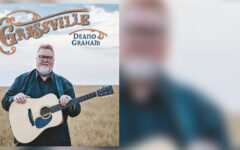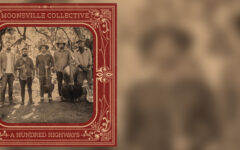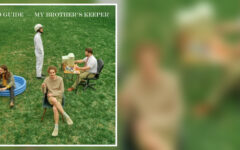
There are very few artists that I will purchase a new album from unconditionally, without first previewing and skimming tracks, or perhaps downloading a few singles. It seems like so many albums these days are filler surrounding three or four good songs – not worth the forty-five minutes it takes to listen the whole way through. One artist whose albums I’ll always consider worthy of immediate purchase, however, is Larry Sparks. He has his own brand and style of bluegrass that he has honed over the years, and when you press play on any of his albums, from the seventies through the present-day, you know exactly what you’re getting: good picking, snazzy guitar work, and signature soulful vocals. His brand-new release from Rebel Records, New Moon Over My Shoulder, hits all the above, with the added bonus of introducing some great new numbers to the Sparks canon.
The album’s first single, the bluesy Take Me Back to West Virginia, has already found quite a bit of airplay in the month or so since its release. It’s a very well-written number about a woman longing to go home, carried by vivid images of a country childhood and Sparks’ yearning vocals. It’s classic Sparks – the album’s press release likens its sound to Tennessee 1949 and Blue Virginia Blue, both apt comparisons. Henry Hill, written by Gary Ferguson and Shane Sullivan, is another new song that is Sparks through and through – just listen to that guitar intro, and you’ll know why. Told from the perspective of a Confederate soldier holding the lines during the Battle of Manassas, it’s a poignant rumination on life, death, and the sweetheart the soldier is addressing.
Two of the songs here are pulled from the early days of country music. Sparks often delves into the Hank Williams songbook, but here he takes a cue from Roy Acuff and Gene Autry. Acuff’s Down in Union County is an excellent album-opener, kicked off with bouncy fiddle and banjo from frequent Lonesome Rambler Michael Feagan and Ron Stewart, respectively. It’s a cheerful, old-timey number that I can imagine being perfect to get the audience going during live shows. There’s a New Moon Over My Shoulder hails from the 1940s, written by Jimmie Davis, and recorded by a number of other country singers, including Jim Reeves and Tex Ritter. Sparks’ inspiration, however, came from Gene Autry, and while his version isn’t quite as swingy as Autry’s, there’s still plenty of country shuffle, plus a wistful tear in the vocals.
Sparks has also dipped into his own past recordings, offering up new versions of a pair of Gospel songs and one number from his brief tenure as Ralph Stanley’s guitarist and lead vocalist. I Only Exist is instantly recognizable as a Stanley classic; dig up the original cut on the 1969 Hills of Home record from King, and it’s amazing how similar Sparks sounds to his younger self. Here, both the song and Sparks are strong as ever. Green Pastures in the Sky has been on a few different Sparks collections and is a fan favorite at his live shows. It’s not to be confused with Going Up Home to Live in Green Pastures – this song is darker and bluesier, with stripped back instrumentation and Sparks’ haunting vocals singing of “that final journey to that green pasture in the sky.” Also recut is New Highway, a light and uplifting mandolin-guided song that tells of Jesus’s saving grace.
Sparks is fifty-plus years into his career as a bluegrass musician, and is still producing work that’s just as good as it was decades ago. He truly has one of the best voices in bluegrass, not to mention his guitar work, and he’s supported here by an excellent band that obviously understands and embraces his style. In addition to Feagan and Stewart, the Lonesome Ramblers here include Jeff Clair (mandolin), Evan Wilson (mandolin), and Matthew Madden (bass). New Moon Over My Shoulder is a must for my album collection; it should be for yours, as well.
The album is currently available from Sparks’ website and live shows for purchase, and on Airplay Direct for radio programmers.







